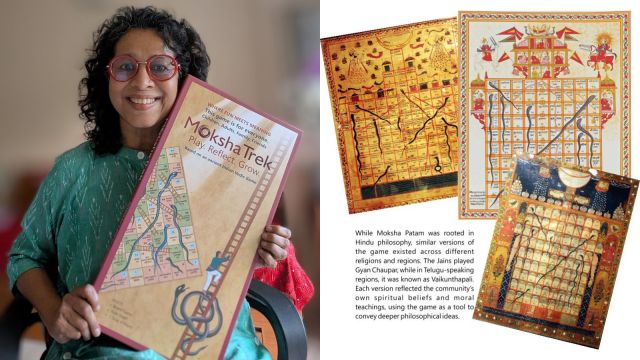Click here to join Express Pune WhatsApp channel and get a curated list of our stories
MokshaTrek: Reviving India’s ancient game of reflection & spiritualism
Designer and communicator Falguni Gokhale has reimagined this ancient wisdom for the 21st century as MokshaTrek.
 While the COVID-19 lockdown saw families return to board games, MokshaTrek predates the pandemic. “Sometimes things happen at the right time, and I’m glad this finally happened,” Gokhale recalls.
While the COVID-19 lockdown saw families return to board games, MokshaTrek predates the pandemic. “Sometimes things happen at the right time, and I’m glad this finally happened,” Gokhale recalls.By Viraj Mandar Paranjape
Long before Snakes and Ladders turned into a global pastime, India had Mokshapatam—a board game created by 13th-century saint-philosopher Sant Dnyaneshwar. He envisioned it not as a contest of luck, but as a metaphor for life’s journey. The ladders in the game symbolise virtues, while the snakes embodied vices—lust, anger, hatred, greed much like the ten heads of Ravan. Through the grip of valour and virtue, one could ascend toward moksha. The game was thus named Mokshapatam: a path toward liberation.
Designer and communicator Falguni Gokhale has reimagined this ancient wisdom for the 21st century as MokshaTrek. What began as background research for a project stayed alive in her mind until it demanded to be finished. “I always wanted to bring back the game in its true spirit but with a design today’s families would find appealing,” she says.
Her friend Hemant Karandikar supported the process through discussions and proof-reading, sharpening the concept. In one early trial, a young girl brought the prototype to her friends which received great reactions, proof that the game resonated across all ages.
While the COVID-19 lockdown saw families return to board games, MokshaTrek predates the pandemic. “Sometimes things happen at the right time, and I’m glad this finally happened,” Gokhale recalls.
Unlike conventional Snakes and Ladders, often reduced to toxic competition reflective of today’s hyper-paced world, MokshaTrek encourages pause. Each square carries prompts that spark conversation—about choices, consequences, and values. Children approach it with imagination; adults engage with its deeper spiritual layer. “Values are not taught as lessons but discovered through play,” Gokhale says.
She hopes the game will soon enter classrooms, linking with the National Education Policy’s emphasis on experiential learning. Just as chess, once an Indian invention, is reclaiming global dominance, MokshaTrek too can offer the world more than nostalgia – it can offer a way to learn ethics and mindfulness playfully.
“The MokshaTrek game can be played alone, with two players, or in a group. It follows the familiar style of snakes and ladders on the board, but I have added another layer through special squares which invite actions, reflections and conversations,” explains Gokhale. “Very young children can play the game simply without the rules, enjoying the basic movement across the board. With older players, the game naturally opens into deeper conversations about choices and their consequences. On the board I have placed a QR code which leads to a website. There one can explore the meanings of the words used on the board. My hope is that this small feature will spark more conversations,” she adds.
At a time when parents and children are engrossed on their phones or buried under work, the game becomes more than entertainment. It is an invitation to sit together, laugh, and reflect—a quiet, playful path to rediscovering dialogue, virtue.
Click here to join Express Pune WhatsApp channel and get a curated list of our stories







